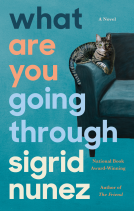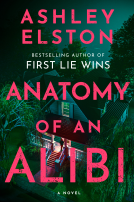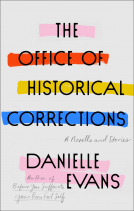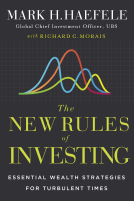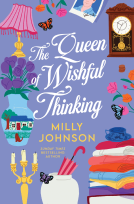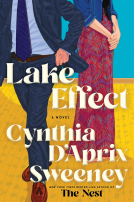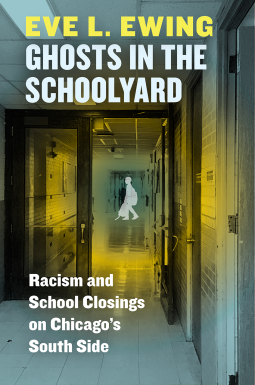
Ghosts in the Schoolyard
Racism and School Closings on Chicago's South Side
by Eve L. Ewing
This title was previously available on NetGalley and is now archived.
Send NetGalley books directly to your Kindle or Kindle app
1
To read on a Kindle or Kindle app, please add kindle@netgalley.com as an approved email address to receive files in your Amazon account. Click here for step-by-step instructions.
2
Also find your Kindle email address within your Amazon account, and enter it here.
Pub Date Oct 05 2018 | Archive Date Nov 15 2018
Talking about this book? Use #GhostsInTheSchoolyard #NetGalley. More hashtag tips!
Description
That’s how Eve L. Ewing opens Ghosts in the Schoolyard: describing Chicago Public Schools from the outside. The way politicians and pundits and parents of kids who attend other schools talk about them, with a mix of pity and contempt.
But Ewing knows Chicago Public Schools from the inside: as a student, then a teacher, and now a scholar who studies them. And that perspective has shown her that public schools are not buildings full of failures—they’re an integral part of their neighborhoods, at the heart of their communities, storehouses of history and memory that bring people together.
Never was that role more apparent than in 2013 when Mayor Rahm Emanuel announced an unprecedented wave of school closings. Pitched simultaneously as a solution to a budget problem, a response to declining enrollments, and a chance to purge bad schools that were dragging down the whole system, the plan was met with a roar of protest from parents, students, and teachers. But if these schools were so bad, why did people care so much about keeping them open, to the point that some would even go on a hunger strike?
Ewing’s answer begins with a story of systemic racism, inequality, bad faith, and distrust that stretches deep into Chicago history. Rooting her exploration in the historic African American neighborhood of Bronzeville, Ewing reveals that this issue is about much more than just schools. Black communities see the closing of their schools—schools that are certainly less than perfect but that are theirs—as one more in a long line of racist policies. The fight to keep them open is yet another front in the ongoing struggle of black people in America to build successful lives and achieve true self-determination.
Advance Praise
“A versatile, deeply perceptive, and imaginative
thinker.”
—Publishers Weekly
“A truly rare cultural phenomenon.”
—Chicago Tribune
“A versatile, deeply perceptive, and imaginative
thinker.”
—Publishers Weekly
“A truly rare cultural phenomenon.”
—Chicago Tribune
Available Editions
| EDITION | Other Format |
| ISBN | 9780226526027 |
| PRICE | $24.00 (USD) |
| PAGES | 240 |
Average rating from 10 members
Featured Reviews
 Melissa M, Educator
Melissa M, Educator
Title: Ghosts in the Schoolyard: Racism and School Closings on Chicago's South Side
Author: Eve L. Ewing
Format: 4 chapters, each focusing on a different aspect of the closing process. Why people care, the history of the schools and closings in the city, the fight with city hall, and the grieving process for lost institutions.
What I liked: It was well organized, well researched, and well written. The author's passion for the subject and anger towards the whole situation was clear, but she still let the research and data speak for itself.
What I didn't like: Nothing about the book. The situation pushed a lot of my buttons.
4/5 stars
I received an ARC of this book through Netgalley in exchange for an honest review.
"We see that this community's choice to resist a school's being characterized as 'failing' is in fact about much more than the school itself: it is about citizenship and participation, about justice and injustice, and about resisting people in power who want to transform a community at the expense of the people who live there."
This book was excellent. It is nonfiction, but it is short and the author's style moves it along very well. I devoured it in two days. That could have been one, but the situation was set out so plainly and made me so angry I had to put the book down for a moment and step back.
From the beginning, when the author gives descriptions of people and places we can see clearly her feelings toward the system. She tells about how board members and superintendent (called CEO) of the public school system are appointed by the mayor and not voted on by the community. She tells about how the first CEO in the process was replaced due to scandal. She makes it obvious that the whole system is corrupt and set for certain children and communities to have a harder time.
The book was tied together primarily by exploring the history of policies that ruin institutions in the Black parts of Chicago. It explored segregated housing, the amount of children that put in a small area, how instead of bussing these kids to other schools throughout the city new schools were built to keep the races segregated and how when the projects were torn down and fewer children were enrolled these schools were closed and the children sent to other schools that performed just as poorly. This was done well. She doesn't hide after making the accusation of racism in the title. She backs it up through the whole book.
 Julie W, Reviewer
Julie W, Reviewer
I thoroughly enjoyed this book. Highly recommended read! Thanks for providing through Net Galley. Five Stars *****
 Lorene K, Librarian
Lorene K, Librarian
This book is a well written, well researched history of the public schools in the Bronzeville neighborhood in Chicago. I've read a lot of news stories about school closings, but this book digs deeper into what went in to those decisions and how the community tried to fight, or at least, be heard. It's criminal what has been happening to these schools. How can we expect these students to succeed when we do everything to try to make them fail?
This book is a must read for everyone, not just those in Chicago or those concerned with schools. I can't wait for it to come out this fall so I can purchase and recommend it. I'm hoping to get to an author event to get it signed, since I am in the Chicago area.
 Kimberley N, Reviewer
Kimberley N, Reviewer
“What do school closures, and their disproportionate clustering in communities like Bronzeville, tell us about a fundamental devaluation of African American children, their families, and black life in general? Is there room for democracy and real grassroots participation in a school system that has been run like an oligarchy?”
Eve L. Ewing keeps it simple. Yes, plenty of anecdotes, stats, and stories are offered within this work, but the bottom line is always clear: you can’t speak about school closures without considering the role racism has played.
There’s always a rush to defend acts of “progress” by couching them under the guise of good intentions. However, even the most sincere of intentions can’t hide the fact that what’s happened in Chicago, and in many other urban communities, is directly related to policies that were put in place to keep blacks and whites separate and not equal.
Ewing is careful to back up each point with proof so there’s never a question of motive. However, she’s also sure to let those who still question the validity of such claims know the reason they’ve failed to understand is because they’ve never bothered to look or ask the right questions.
A school is shuttered due to underutilization but the lack of use is due to the tearing down of the very community it was meant to serve.
Students and teachers are pegged as underserved and under-resourced, but they’re neither given the resources nor have access to the funding sources to correct the problem.
It’s impossible to point the finger at the community for these closings when the very infrastructure they depend on has set them up to fail.
Ewing addresses all of this, and then some, with compassion and objectivity. Giving voices to those we otherwise wouldn’t consider because the national narrative has always been against them.
A must-read. Highly recommend.
This book is a close study of the systemic and institutionalized racism that Ewing witnesses in the Chicago public school system. As signaled by the title, her writing is so evocative; scholarly and also anecdotal, which makes both an approachable read and one that will inspire a lot of critical dialogue among educators. This is a book I want to / plan to read with my department of teachers, thinking about the parallels to our school systems and what we can do better.
 Reviewer 486327
Reviewer 486327
Absolutely amazing. I knew going in that Eve Ewing was going to blow my mind and I was not disappointed. This book is wonderfully researched but what's more is that you can tell the empathy and the passion that Ewing has for the topic that she is discussing. Much like she says in the book this goes beyond CPS schools and touches on the systematic racism that plagues our history and our present times. She is able to make the connections to history and to ripple effect that affects people today. I love Chicago but recently I have been aware of the racism that haunts this city. Eve Ewing made me see the city from another perspective and to notice the areas that I wasn't aware existed before. I am able to quote things to people and I can see how it makes them change their perspective about certain "truths" they thought they had. Her sociology truly shines in this book as she studies history, geography, cause and effect and the very real people that are affected by all of this. I am so glad that Eve Ewing was able to give voice to the ghosts in the schoolyard and I think its the rally we need to call us to action.
 Linda S, Librarian
Linda S, Librarian
GHOSTS IN THE SCHOOLYARD by Eve L. Ewing is a non-fiction work about the 2013 decision -- and subsequent public reaction – regarding the closing of roughly 50 public schools in Chicago, most of which were in predominantly African American neighborhoods. Ewing, assistant professor at the University of Chicago School of Social Service Administration, asks "Why do people care so much about failing schools?" She begins by defining racism and argues that as a sociologist, racism is not so much what individuals think and see as the "set of structures organizing the way society works… systems… bound up in in the perpetuation of historical policies rooted in more explicit racism." Ewing uses her first chapter of four chapters to profile Walter H. Dyett High School and the month-long hunger strike that community members held to keep it open. Still focusing on the Bronzeville neighborhood of Chicago, she next reviews the history of segregation and public housing; our students, too, learn about red-lining in Chicago. In a third chapter, she shares transcripts of public hearings so that the community activists, teachers, and students can be heard. In her final chapter, Ewing describes institutional mourning – "the idea that we can mourn lost institutions just as we mourn lost people." It is a fascinating study touching on the turnover and corruption in CPS, as well as a lack of transparency and seeming inability to recognize the needs and wants of local communities.
I have been suggesting GHOSTS IN THE SCHOOLYARD to student researchers due to their interest in K-12 education and the relatively local connection since many volunteer or interact with CPS students and/or learn about Chicago neighborhoods. Ewing writes in a very accessible way and this is the type of text which could become required summer reading for a course like American Studies, or Social Justice. The text includes about 30 pages of biographical references, plus a useful index, as well as definitions and background on a set of terms and people. GHOSTS IN THE SCHOOLYARD received starred reviews from Booklist and Library Journal.
Link in live post:
https://www.illinoisreportcard.com/School.aspx?source=studentcharacteristics&Schoolid=150162990250863
Readers who liked this book also liked:
Marie Bostwick
Historical Fiction, Literary Fiction, Women's Fiction
Halle Tecco
Business, Leadership, Finance, Health, Mind & Body, Nonfiction (Adult)
Rachel Joyce
Historical Fiction, Literary Fiction, Women's Fiction
James McBride
General Fiction (Adult), Historical Fiction, Literary Fiction
Mark Haefele; Richard C. Morais
Business, Leadership, Finance, Nonfiction (Adult)
